Luke 2:8-20
8 And in the same region there were shepherds out in the field, keeping watch over their flock by night. 9 And an angel of the Lord appeared to them, and the glory of the Lord shone around them, and they were filled with great fear. 10 And the angel said to them, “Fear not, for behold, I bring you good news of great joy that will be for all the people. 11 For unto you is born this day in the city of David a Savior, who is Christ the Lord. 12 And this will be a sign for you: you will find a baby wrapped in swaddling cloths and lying in a manger.” 13 And suddenly there was with the angel a multitude of the heavenly host praising God and saying,
14 “Glory to God in the highest,
and on earth peace among those with whom he is pleased!”
15 When the angels went away from them into heaven, the shepherds said to one another, “Let us go over to Bethlehem and see this thing that has happened, which the Lord has made known to us.” 16 And they went with haste and found Mary and Joseph, and the baby lying in a manger. 17 And when they saw it, they made known the saying that had been told them concerning this child. 18 And all who heard it wondered at what the shepherds told them. 19 But Mary treasured up all these things, pondering them in her heart. 20 And the shepherds returned, glorifying and praising God for all they had heard and seen, as it had been told them.
Out in the quiet fields near Bethlehem, shepherds gathered under the vast night sky. Suddenly, an angelic chorus broke the silence, announcing the birth of the Savior. In the midst of the shepherds’ amazement and disbelief, a loud message cut through the darkness: “Fear not, for behold, I bring you good news of great joy that will be for all the people.” (Luke 2:10)
Gratitude, this unexpected gift, showed up for the shepherds like an unwrapped present. In our busy lives, it’s easy to miss the powerful magic of gratitude. But in that moment, the shepherds were standing on the edge of something eternal: joy flows from gratitude.
Think about how they reacted: without hesitation, the shepherds embraced the divine announcement and rushed to see the miracle in the manger. Gratitude powered them forward, turning uncertainty into purpose.
Gratitude helps us push through fear and doubt. It’s not just for those Instagrammable moments but also totally relevant in the everyday chaos. Like those shepherds, we can also experience the divine invitation to embrace gratitude.
Pause for a moment. Reflect on the unexpected joys that have brightened your life this week, especially the ones you might have missed. Gratitude is not just a warm feeling; it drives us to move forward with purpose.
As we journey through this advent season, let’s unwrap the gift of gratitude. What moments of joy have you overlooked in the hustle of life? How can gratitude transform your uncertainties into purposeful action?
Matthew 1:18-25
18Now the birth of Jesus Christ was as follows: After His mother Mary was betrothed to Joseph, before they came together, she was found with child of the Holy Spirit. 19 Then Joseph her husband, being a just man, and not wanting to make her a public example, was minded to put her away secretly. 20 But while he thought about these things, behold, an angel of the Lord appeared to him in a dream, saying, “Joseph, son of David, do not be afraid to take to you Mary your wife, for that which is conceived in her is of the Holy Spirit. 21 And she will bring forth a Son, and you shall call His name JESUS, for He will save His people from their sins.”
22 So all this was done that it might be fulfilled which was spoken by the Lord through the prophet, saying: 23 “Behold, the virgin shall be with child, and bear a Son, and they shall call His name Immanuel,” which is translated, “God with us.”
24 Then Joseph, being aroused from sleep, did as the angel of the Lord commanded him and took to him his wife, 25 and did not know her till she had brought forth her firstborn Son. And he called His name JESUS.
How well do we cope with change? We make plans and imagine how they will work out, and then suddenly we face a new and unexpected reality and all those expectations evaporate. It is not easy to cope with and we can understandably grieve the loss of what we had hoped would occur.
In this short passage, Joseph has to deal with this not just once, but twice! He was engaged and happy, expecting the joy of getting married and maybe looking forward to starting a family together. However, during their engagement, Joseph finds out that Mary is pregnant. He knows the baby is not his, and in shock starts to think of the only respectable thing he can do, to quietly release her from her commitment to him. However, as he went to sleep with these thoughts, he didn’t know that another huge change was coming.
This second change involves a dream and an angel! The angel brings another new plan for their lives, one we can be quite sure Joseph had never imagined. There will be no quiet separation, but the marriage will go ahead, there will be no ordinary baby but a divine child, there will be no choosing a name as they have a name already given by God and there will be no condemnation for sin, but the arrival of the Saviour.
We could forgive Joseph for feeling a little overwhelmed with all these changes. We could understand if he asked for time to absorb the news and its meaning for his life. Yet Joseph wakes from his dream and immediately proceeds with the new plan given by God, without a moment’s hesitation or doubt.
How do we process change in our lives? Joseph had plans, but when it came down to it, no matter how he felt, he was willing to give God’s plans priority and be obedient. Life often fails to meet our expectations and change is always interrupting our plans. How do we respond? Can we look at the changes in our lives and seek God’s will as our top priority? Are we willing to let go of our plans and let God show us what He has for us? What might this look like in my everyday life?
Heavenly Father,
I thank you that I do not have to know all the plans all the time, but that my plans are in Your hands. Help me Lord as I live my life each day, to listen for your changes, for your will and for your way. Help me to obey you in the small things and the larger ones, learning true reverence for who you are and in assurance that you love me and want the best for me. Thank you that you are our guide and comforter in all the changes and surprises of life. Amen.
Advent is the season of active watching and waiting for the coming of the Lord as we anticipate the joy of Christmas and the coming of God’s kingdom of justice and peace. This year it is especially relevant and challenging as we watch and wait with hope amid the deep pain and suffering caused by the current hostilities.
We have therefore decided to focus our Advent reflections on some important virtues and values the Christmas story reveals to build and strengthen our faith at this difficult time.
The first of these is humility which is so profoundly revealed in the humble circumstances of the birth of Jesus in an animal shelter in Bethlehem where he was laid in a feeding trough because there was no room for Joseph and Mary at the inn.
Mary also demonstrates great humility in accepting the summons of God to become the mother of Jesus, the Son of God. She responds to the angel Gabriel with the words, “Behold the handmaid of the Lord; let it be to me according to your word” (Luke 1: 38).
The virtue of humility is always found closely associated with divine grace: for God resists the proud but gives grace to the humble (James 4:6). Her humble submission to God’s will is in stark contrast to the pride and paranoia of King Herod who arrogantly seeks to destroy the baby Jesus by ordering the murder of all male babies under the age of two years when the Magi come to Jerusalem and ask, “Where is the one who has been born King of the Jews? We saw his star in the east and have come to worship him” (Matthew 2:1).
In her song of praise glorifying God (after meeting Elizabeth), Mary rejoices in God her Saviour because of his mercy and grace in looking on her humble state and choosing her to be the mother of the Lord. She also thanks God for his mercy which is extended to all those who fear him from every generation and for His mighty deeds he has performed in scattering those who are proud in their inmost thoughts and lifting up the humble (Luke 1:46-56).
The words of the Canticle of Mary known as the Magnificat have been incorporated into the liturgy of most historic churches and are recited at the start of Advent and in the prayers of the Church and is one of the most ancient Christian hymns.
As we sing and recite the Magnificat this Advent season, let us also thank God for His mercy and grace towards us in the gift of His Son, and like Mary submit our lives to the will of God in humility and obedience – for in His will we find our peace, joy, and strength amid the pain and suffering around us!
How can we cultivate the same attitude of humility as that of Jesus, which was also shared by Mary this Advent? How will this affect the way in which I interact with those around me – my family, friends, work colleagues and those who actively oppose me?
I am writing to let you know that Richard Mayhew has decided to step down from his current role as CEO of the Nazareth Trust, which will become effective on 31st December this year.
Richard has been with us as CEO for over 8 years, a full term for a CEO of such a charity. Richard has been discussing his future plans with us over the summer months and reached a final decision to leave in early October.
As a Board, we have witnessed under his leadership significant growth in all our activities and seen firm foundations being laid by Richard for the future of the Trust’s activities in Nazareth. We recognise that this task has been difficult in the face of a pandemic and our financial challenges of last year.
We have admired Richard’s determination to face such challenges head on, to successfully build a talented team to take forward our activities in the Nazareth Hospital, the Nazareth Academic School of Nursing, the Nazareth village, Serve Nazareth and the Pastoral Team, as well as building impressive support for our activities in the USA.
We want to take this opportunity to thank him for his considerable efforts as CEO and wish him well for the future. We will be seeking to support Richard as he seeks new roles and challenges closer to home in the UK.
From 1st January, Waseem Dibbini, currently Richard’s Deputy, will become Acting CEO for the Trust, as we consider as a Board over the first quarter of 2024 the best way forward. We will, of course, seek to keep you informed on the future leadership of the Trust.
I wish to thank all our supporters for your continuing prayers for the Nazareth Trust, and prayers for the safety of our staff and their families in Nazareth. We are a Christian institution, so we hope and pray with confidence in our Lord that we will be able to witness to our faith in this difficult time by bringing words of peace and healing to all whom we serve through the work of the Nazareth Trust.
Geoffrey Spence
Chair of Board of the Nazareth Trust
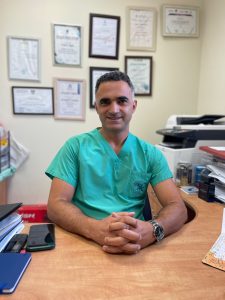
Tamer Hidari at his office at the Nazareth Hospital.
Originally from Sakhnin city, Tamer Hidari is the chief nurse of the operating rooms at the Nazareth Hospital. He is happily married to Haya, a lawyer, and has a four-year-old son named Hassan. In addition to his B.S.N. and M.B.A. from the Hebrew University in Jerusalem, Tamer furthered his studies by learning about leadership and team development at the International Business Management Institute in Berlin and safety and risk management through Inbar and the Israeli Ministry of Health. Tamer is currently an active advisor for the National Health head nurse office.
Tamer’s unique connection with nursing stems from his family history.
I was around 16 or 17 when my grandpa had liver failure and was waiting for a new liver. I travelled with him across different hospitals for two or three years: Hadassah, Rambam, etc. We went all over. During those hospital trips, I saw what we call “angels in white”, the nurses. I saw how they treated people and looked after them.
At the time, I had to decide my future. Initially, I was planning to study medicine in Romania with some friends. But my grandfather passed away, waiting for a new liver, so I changed my mind. I decided to stay with my family and support them, so I went to study nursing at the Hebrew University in Jerusalem.
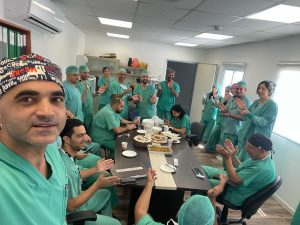
I started in November 2017, so it’s been about six years and a few months. My previous job was at Hadassah Hospital, where I was the Chief of General Surgery, Organ Transplants and the Trauma Unit for nine years. During this experience, I gained a lot of skills and knowledge, and at some point, I decided to come back home to serve my community.
Yes, I didn’t think about moving back home from Jerusalem for a while. But at some point, I came to visit the Nazareth Hospital. I saw the people and the environment: many experts treating patients with much care. It felt like a family. I was born here, but I was small, so I can’t remember. It felt like closing the cycle.
I also got inspired by Professor Fahed Hakim and his good plans for the hospital’s future. I thought I would like to help make these plans come true, so here I am, and I’m really happy. I’m satisfied with the workflow and what is going on here at the hospital. Even as a small hospital, we are pioneers in some issues, so I think we’re doing a great job.
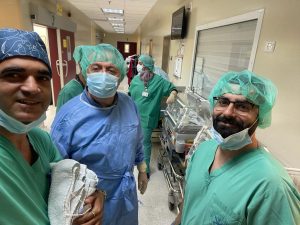
I came from Hadassah, which is a huge hospital. When I first came for a visit, I noticed that the buildings were smaller, but I was impressed once I went inside and saw the staff and experts that work here. At the Nazareth Hospital, we provide medical treatment and patient care to a high standard. We should plan to get more innovative, have more technologies and grow. And I don’t talk about buildings, but providing more medical services that we currently don’t have. We serve around 500,000 people in the area, and many patients must travel elsewhere if they need a specific procedure we don’t offer.
First of all, I take care of patient safety. I am also in charge of staff management, ensuring our workflow is safe, direct, and smooth. I often need to assign priority levels to different surgeries and gather a multidisciplinary team, including doctors, anaesthetists, X-ray technicians, etc. I need to gather them all for one surgery. I am also aware that surgeries are part of our daily work life. However, they are a major event for the patients and can be very terrifying. That’s why we need to deal with every patient with extra care, providing them with everything they need and making them go to the operating room as calm as possible and go out healthier.
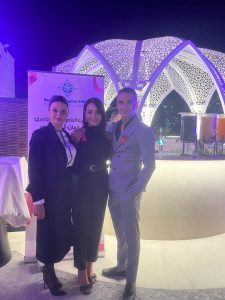
Tamer and two colleagues at the Breast Cancer Conference he organised.
The most challenging is to give the best patient care and get the best from the staff. We pray and make sure every surgery is safe and unique. We have to deal with many challenges during our day: there are a lot of potential disruptions. The most important thing is that every patient that comes in is satisfied, calm and happy that they chose us.
There is a lot of adrenaline from the morning until late night hours. One thing that makes me happy is that we see patients get better. They are so excited and surprised after the surgery that they often return to thank us and share that it was a good journey. We try to take care of every small detail: nobody needs to be cold or in pain. We also keep the families informed before, during and after the surgery. We are happy that despite the challenges, we’re getting excellent results.
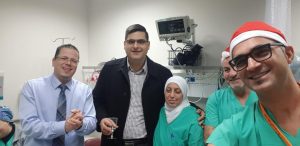
Yes, the Nazareth Academic School of Nursing sends us some students. We explain to the nursing students the importance of the operating room, the rules and our high standards. Lately, we’ve had a few new nurses join the operating rooms. We need to go from A to Z with them and explain all the protocols and procedures. Junior staff come in with many questions and fears, but after a few months, we can proudly say they are well-trained professionals. What makes our operating rooms unique is that we are family first, so we look after each other and second, we act like professionals.
I’ve done a few courses and have a subspeciality in organ transplant. When I was working in Hadassah, I was in charge and was there in every transplant surgery. I miss that because we don’t offer this kind of procedure here. However, lately, we are getting more technologies that help us in surgeries, which is also fascinating. For example, we have many laparoscopic surgeries, especially in general surgery and urology. We’ve been offering a new endourology service for three years now. Every year, doctors from around the country come here to receive training in this procedure.
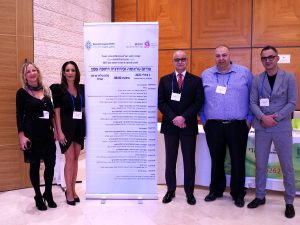
Tamer and his colleagues at the Trauma Conference he organised in 2020.
Yes, we do C-sections, and we have a unique procedure called FAUCS: French AmbUlatory Cesarean Section. We were the first hospital in Israel to perform this kind of surgery. One of our surgeons, Dr Handler, is one of the ten doctors in the world performing this surgery. During this procedure, we do the same skin incision, but inside, we divide the muscles and arrive at the baby from behind, not directly, making a small incision in the uterus. During the surgery, we try to provide a warm and supportive environment for the parents, and sometimes, we make a phone call on WhatsApp or a Zoom call with other family members. We want it to be a happy event involving the whole family. Seeing the parents’ happiness and joy is really touching, really unique. It’s the next step in patient care.
C-section procedures can be traumatic for patients who undergo an urgent C-section as you feel like they’re taking your baby away until you get better. Here, we are making a new standard of care for the whole family. We move from trauma to a happy event.
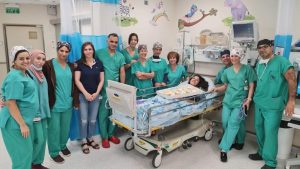
Tamer and colleagues celebrating 900 FAUCS at the Nazareth Hospital.
Yes, patients are usually under spinal anaesthesia. However, we’ve had three or four cases when we couldn’t offer spinal anaesthesia because of some deformation in the spinal cord. If that’s the case, the mother must go under general anaesthesia, and the husband stays in the operating room. We also place the baby on the mum after they are born. The demand for the FAUCS is going up yearly, and some patients come from far away, most of them from central Israel. We had lots of celebrities too. We’ve also been training surgeons from other hospitals to perform these surgeries.
Yeah, it’s so much faster. Mothers who had a regular C-section usually start to walk or go down from the bed five or seven hours after the procedure. Those who had the French C-section tend to walk by themselves from the operating table to their bed, and you can find them walking around the ward two hours later. One day after, they go back home like nothing happened. Some even return to work one or two weeks later: it’s incredible!
We try to give each patient what they need. Many of them are religious and ask for kosher meals, so we provide that. Some people must follow specific rules due to their religion, and we accommodate their requirements. We try to make everybody happy and satisfied and deal with every patient’s request promptly.
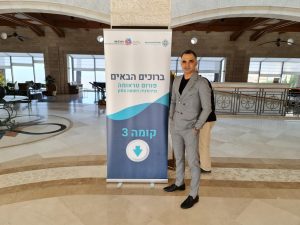
They come to visit patients. I’m happy to say that they come here every Friday between 12pm and 1pm for a small prayer. This prayer gives us the faith and the support we need to help us be stronger during the week ahead of us: every week we’re dealing with something new, some tragedy or a happy event. We’re so glad to have this time to share as a group of believers.
Recently, I started a new scholarship in management and leadership through the Ministry of Health and the Prime Minister’s Office here in Israel. We had the first meeting on Tuesday with 30 people from all over Israel; it was amazing. Everybody introduced themselves, and when I started to talk about the Nazareth Hospital, people were shocked to hear that we were 162 years old.
They were also surprised to hear about last year’s strike, the support from the staff members and how we act like a family. Everyone came to work anyway, even without knowing if there would be a salary. They were shocked and told me that nobody would have shown up at work the next day if this had happened in their hospital. I think our strength is, firstly, that we are a family. We have a lot of faith in the institution and give our best each day to make the impossible possible. I am proud to work here, and I think it’s really important to talk about it.
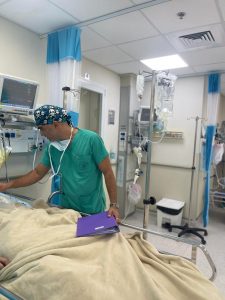
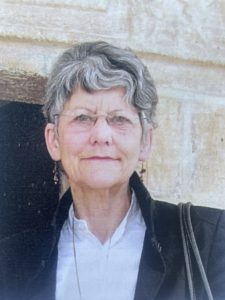
It was with much sadness that we learned of the peaceful passing of Joy Fraser on 26th September 2023 after a short illness.
Joy was known and loved by many both in her homeland of Scotland and further afield.
She was the daughter of Alexander and Daisy, her father a minister in the Free Church.
She was brought up in Dumbarton, the middle of five children. After leaving school, she embarked on a career in nursing and midwifery, in which she was much respected and which was to take her to Malawi and Nazareth.
Her career started at Glasgow Royal Infirmary, where she became a sister in A & E and a Night Duty Supervisor. After some years, she was called to missionary work in Malawi, serving as a midwifery tutor in the Church of Scotland Hospital.
She then returned to Scotland as part of the commissioning team for the new build at Glasgow Royal Infirmary.
Joy then moved to the Highlands to be a Divisional Nursing Officer at Raigmore Hospital in Inverness.
It was from here that she went with EMMS to serve as Director of Nursing at the Nazareth Hospital in the mid 1980’s. During her time there, she was highly regarded and played a significant role in the work of the hospital, going on to serve as a trustee and making many long-term friendships.
She completed her eminent career in Inverness, working as a Health Board Executive for the Highlands.
During her time in Inverness, she was an active member of Smithton Free Church.
In 2009, Joy moved to Carluke. Although retired, she did not in any way slow down. She was very involved in many areas of church life within St John’s Church of Scotland and the local community.
Joy had a real heart for people, but especially young people, being involved with various youth groups and the local High School. She was a regular attender at worship, often leading prayer meetings and Bible studies and assisting at the weekly coffee morning.
She was a committed member of the prayer team at Braehead Christian Healing and Retreat Centre, where she also served as a trustee.
Joy was a member of Listen Well Scotland and was instrumental in establishing Carluke Listeners, now with a large number of volunteers offering Christian listening throughout the local area.
A service of thanksgiving for Joy’s life was held in Carluke, attended by people of all ages and from all walks of life, many of whom had known her from times shared both in Scotland and Nazareth. During the service, Rev Elijah Obinna led the congregation in a prayer of thanksgiving for Joy’s sense of what was good, right and decent, for her warmth and love, for every life she enriched and for the faith by which she lived.
At Joy’s request, the gathering afterwards in the church hall was an opportunity to share fellowship together. However, most importantly, it gave an opportunity to share how God had touched people’s lives through knowing Joy.
At her burial the following day in Inverness, Rev David Meredith described Joy as an independent and strategic thinker with a keen, biblically informed mind who was not afraid to challenge the status quo and whose advice was always fresh and insightful.
She had a heart for God’s church and its mission in the world and was generous in sharing her many gifts with others. She was particularly gifted in hospitality, counselling and listening and had a deep affinity with young people, developing strong relationships of trust and encouragement.
Joy will be remembered for her elegance and for the calm and sensitive way she shared her faith.
But in everything, Joy sought only to give glory to God. Her life was rooted in her strong Christian faith and her love for the Lord, whom she trusted and served all of her days.
She will be much missed by all who had the privilege to know and love her.
May she rest in peace with the Lord she loved and served.
We would like to extend our sincere thanks to all those of you who have sent us messages expressing your deep concern and prayer support for the staff and institutions of the Nazareth Trust following the horrific violence and destruction of life we have witnessed over the past days. These very tragic events have deeply traumatised both Jewish and Arab communities in Israel and Gaza and we share in their pain and sorrow at this very challenging time for all of us.
Our prayerful desire is that the Nazareth Hospital EMMS will continue to provide a ministry of healing, hope and hospitality in Jesus name to all those who come to us in their hour of need (as it has during past wars and conflicts in the Holy Land). We also pray that the entire campus of the Nazareth Trust (including the Doctor’s House, the Nazareth Academic School of Nursing and the Nazareth Village will provide a place of peace and refuge to all our service users and visitors during the current conflict.
Please join us in continuing to pray for the following needs in the days and weeks ahead:
With our thanks and gratitude for your prayers and support during this difficult time.
God bless!
Richard Mayhew
CEO of the Nazareth Trust